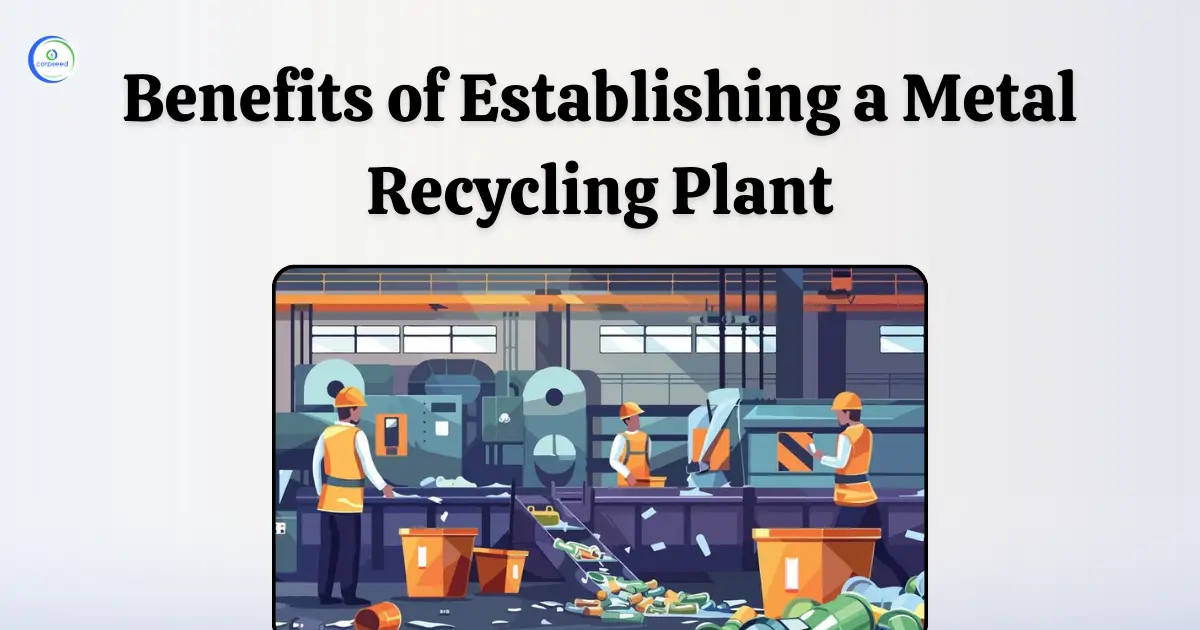The global demand for raw materials is continuously increasing due to the growing economy and rapid industrialization. As sustainability continues to become a central focus of the sector, metal recycling plants are playing an increasingly important role. These facilities are essential not only to minimize environmental impact but also to ensure long-term availability of resources. Amidst altering regulations, technological innovations and increasing awareness, the metal recycling industry is experiencing a transformation that is opening up significant business and environmental opportunities.
Table of Contents
About Metal Recycling Plants
Metal recycling plants are industrial services that collect, process, and restore waste metals to the production cycle. These plants handle ferrous and non-ferrous metals, converting the waste into usable raw materials using techniques such as shredding, melting, sorting and purification. The recycled metal are then used in many sectors including automotive, construction, manufacturing and electronics.
--------------Blog Contact Form-------------
Such facility contributes to minimizing dependence on virgin materials, reducing landfill waste, conserving energy, and reducing emissions associated with conventional mining and ore processing. These operations are vital to building a more circular and sustainable supply chain and also provide significant economic benefits.
Why Metal Recycling is Crucial
Given the current industrial scenario, the importance of metal recycling cannot be exaggerated. With limited natural resources and increasing environmental challenges, metal recycling serves as both a practical and strategic requirement.
- Conservation of Natural Resources: Recycling metals minimizes the demand for raw ores, conserving finite reserves such as iron, copper, and aluminium for future use.
- Reduction in Carbon Emissions: The recycling process significantly reduces greenhouse gas emissions compared to primary metal production, making a significant contribution to emissions reduction goals.
- Energy Efficiency: The production of metals from recycled materials needs comparatively less energy often up to 95% less than mining and processing raw ores.
- Waste Minimization: Recycling helps minimize the amount of metal that ends up in landfills, leading to cleaner urban and industrial environments.
- Economic Sustainability: Recycled metals offer a cost-effective substitute to primary materials, alleviating input costs for manufacturers.
Trends in Metal Recycling Industry in India
The metal recycling industry is growing swiftly due to technological advancements, regulatory support and environmental necessities. These trends are restructuring operations, refining efficiency and boosting investment.
- Integration of Advanced Automation: The plant are implementing AI-powered systems for detailed sorting, automated shredding and improved quality control, thereby mitigating manual intervention.
- Expansion of Structured Recycling Units: Formal recycling infrastructure is growing, substituting disjointed and informal setups, and there are more compliant and higher capacity units.
- Growing Emphasis on Green Manufacturing: Manufacturers are progressively using recycled metals to mitigate their carbon footprint, aligning with global sustainability norms.
- Policy and Regulatory Enhancements: Governments are promoting recycling friendly principles, incentives, and compliance mechanisms to enhance formal sector participation.
- Increase in Private Sector Investments: Due to the increasing interest of private equity firms and corporations, capital inflows are increasing and accelerating the technological upgradation.
- Urban Mining and E-Waste Integration: The Industry is diversifying into urban mining, extracting valuable metals from e-waste and consumer products.
Also Read: Benefits of Establishing a Metal Recycling Plant
Opportunities in India’s Metal Recycling Sector
With a growing focus on sustainability, industrial growth and job creation, the metal recycling sector provides a host of untouched opportunities. Strategic investment and policy support can unlock major value in the value chain.
- Development of Modern Recycling Plants: The possibility of setting up advanced recycling facilities equipped with emission controls, efficient smelters and modern sorting systems is increasing.
- Streamlining Scrap Collection Networks: Create organized network of scrap collection that supports local economies and ensures a continuous supply of raw materials.
- Expansion to Underserved Regions: New recycling units can be profitably setup in areas with limited infrastructure, minimizing transportation costs and tapping into local scrap supply.
- Vocational Training and Job Creation: As the industry develops, the demand for skilled professionals trained in machinery procedure, safety compliance and process optimization increases.
- Digital Integration and Smart Logistics: The Adoption of digital platforms has streamlined scrap procurement, increased traceability and improved supply chain efficiency.
- Public-Private Collaborations: Strategic partnerships between industry and regulatory bodies can facilitate the development of a compliant and scalable recycling entity.
Future Outlook
The metal recycling sector is on the verge of a major transformation. With a focus on environmental compliance, circular economy integration and efficient use of resources, recycling is becoming a cornerstone of sustainable industrial practices. The future will see extensive adoption of smart technologies, blockchain facilitated supply chain transparency, and expanded applications for recycled metals in high performance manufacturing.
As the industry requires to carbon neutrality and green operations, recycled metals are replacing virgin inputs in many vertical sectors. Regulatory framework and infrastructure development will sustenance more organized growth, which will confirm long term sustainability. As the sector updates, it must not only fulfill industrial requirements but also align with wider environmental and social governance goals.
Conclusion
In conclusion, metal recycling stands as an important pillar in the journey toward a sustainable, resource effective industrial ecosystem. It provides a dual benefit addressing environmental challenges while supporting economic growth. By implementing technological innovation, structured investment and regulatory support, the industry is well located for rapid progress. The benefits of modernizing and growing recycling infrastructure are extensive, from energy savings and emissions controls to job creation and physical security. In the coming time, the role of metal recycling will only accelerate as part of the global shift toward cleaner and smarter manufacturing.
This portion of the site is for informational purposes only. The content is not legal advice. The statements and opinions are the expression of author, not corpseed, and have not been evaluated by corpseed for accuracy, completeness, or changes in the law.
BOOK A FREE CONSULTATION
Get help from an experienced legal adviser. Schedule your consultation at a time that works for you and it's absolutely FREE.



.webp)





